Laila Fakhoury hustles nonstop to redefine Gainesville’s arts community
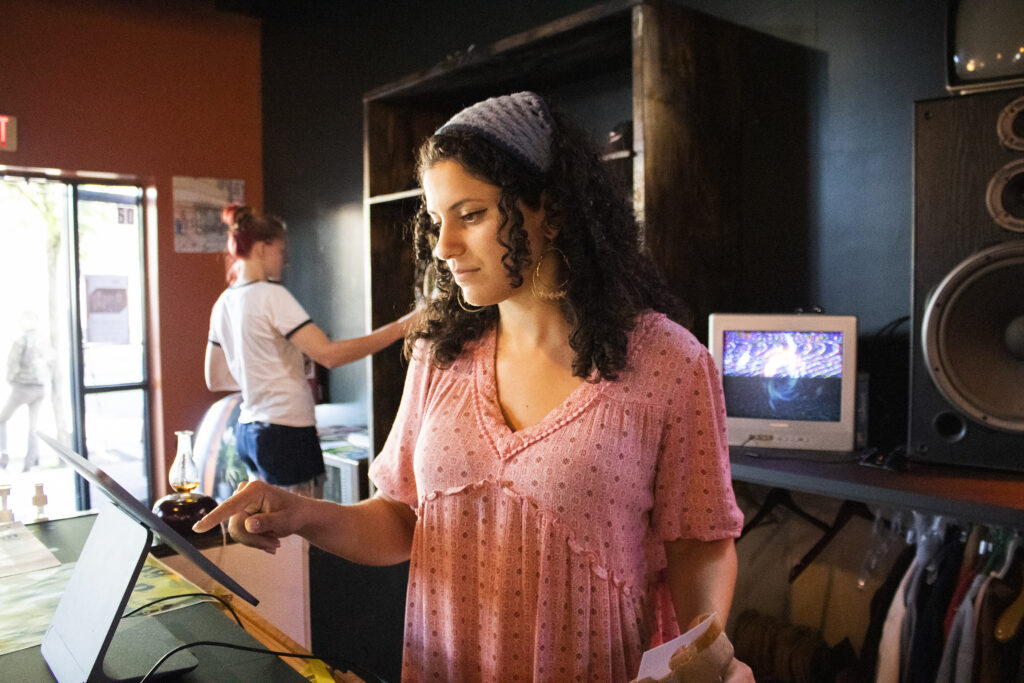
Laila Fakhoury co-founded the How Bazar two years ago. It has blossomed into a beacon of creativity in downtown Gainesville. Her watchful eye, careful preparation and unbreakable tranquility allow the business to run its locally loved markets.
June 1, 2022 | Story by Abigail Hasebroock | Photos by Lawren Simmons
7:47 a.m.
A brakeless bike might sound like an oxymoron, but that is what Laila Fakhoury rides. She craves speed and dislikes stops.
Most days, her sleek, black racing bike grips the route from her apartment on Gainesville’s West University Avenue to downtown, where she works.
But this spring Sunday morning is different. She set her alarm for 6, but it’s already 7:30 when she awakens. On weekdays, she’s up at an ungodly hour to make a 5:15 CrossFit class, but the exhaustion of the week has caught up to her.
Fakhoury, 24, doesn’t let the lost time tie her into an anxious knot. She moves forward in calmness — it’s what she’s trained herself to do.
She stumbles into a pair of light-washed jeans, a beige tank top, a red flannel and black sneakers, but not quite the stylish kind. They have Velcro straps, the kind of shoes meant for long days spent upright.
She twists her dark curls into a bun on the top of her head. With her iPhone and some cash in hand, she begins the trek from her apartment, where she lives alone, to the How Bazar, nestled among coffee shops, bars and restaurants. She’s on foot, her bike sitting forlorn inside the How Bazar building, waiting to be used later that day.
The How Bazar is a business she co-founded in 2020 that pumps energy into the heart of downtown Gainesville. It’s a multi-purpose hub of arts, music, clothing and creativity born out of a desire to uplift small-business owners, artists and musicians in and around the Gainesville community. The How Bazar merchants sell everything from vintage clothing and paintings to candles and healing crystals at pop-up street markets held in the evening. This day marks the third How Bazar night market of its kind.
None of it would be possible without Fakhoury’s faithful preparation or unparalleled patience.
8:07 a.m.
Fakhoury strolls into Volta, a coffee shop near the How Bazar. Coffee is not religion, but on this morning, she can’t thrive without it.
Iced chai latte in hand, she unlocks the front door of the How Bazar and enters the dark space. It explodes with organized artistic chaos: old TVs exhibiting static-filled screens, racks of vintage clothes, a life-size skeleton dangling on the wall and furniture that looks like it was snatched from a 1970s yard sale. And yet, Fakhoury and her four co-owners — Holly Mccoy, Ryan Akridge, Jose Peruyero and Khary Khalfani — are still adding to the space.
It feels like a cool older sister’s bedroom. But unlike the forbidden territory of a secretive sibling, there is nothing illicit about the How Bazar or anything Fakhoury has created. And she doesn’t want her work to just stay in Gainesville, either; she hopes to expand to other cities and even venture across the state border.
But for now, she has planted her entrepreneurial roots in Gainesville and is content with that.
Fakhoury grabs a blank sheet of paper, sticks it into the clamps of a clipboard and hunches over it with a pen to map out today’s 66 vendor booths. More than half the vendors have never sold at a night market before.
The selling begins at 4 and ends at 10 — night market vendors set up in the sun and pack up in darkness. The event operates similarly to a local farmer’s market, but the allure of the evening sets it apart.
The last one drew consistent crowds, despite February downpours and frigid-for-Florida temperatures. Rain or shine, the market is a bright light, and the vendors are moths hurtling toward it, doing whatever they can to secure a spot.
That is largely because Fakhoury and her co-owners refuse to charge vendor fees. So even if a vendor doesn’t make a single sale, they can still present their name and brand without giving a dime to their How Bazar host. Fakhoury cares about her vendors. During February’s market, she ran to each booth ensuring everyone stayed dry.
That kind of nurturing comes naturally for Fakhoury. She grew up in a Palestinian-American family of achievers and, as the youngest of five kids, she learned to face life’s obstacles with grace.
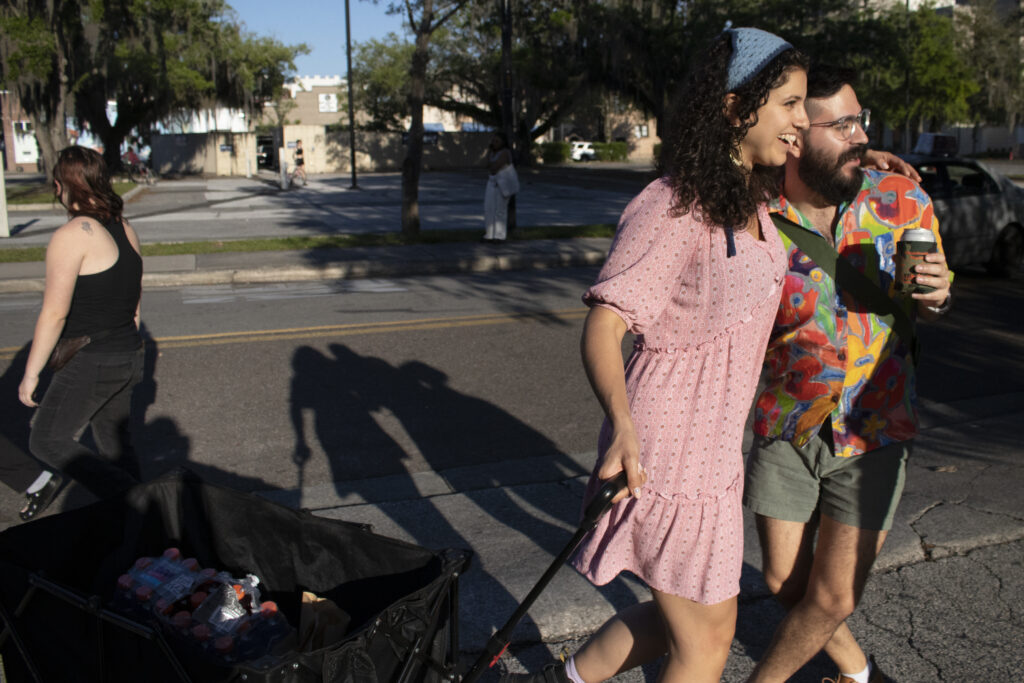
Fakhoury is frequently stopped for hugs and conversations during her “fairy godmother” trips around the market to deliver relished drinks and goodie bags to each vendor.
Her oldest sister, Nawel, is a director of employee experience at LinkedIn in New York. Her sister Nadia is a chiropractor in Los Angeles. Her sister right above her, Malak, is studying to receive a master’s in counseling in Anaheim Hills, California. Her brother, Kareem, is a resident physician in Denver. And their parents, mother Manal and father Riadh, both have doctoral degrees.
The Fakhoury fire barrels through each family member’s veins. Manal and Riadh chose to make a life in Ocala more than three decades ago to raise their family, but settling to them took on a whole new meaning. They did not allow the hurdles of being Muslim in America stop them from achieving their version of the American dream. Recently, in 2021, Manal ran for mayor. She lost to the incumbent but not before making a stand for all that she believed in.
That determination courses through Laila’s veins, too. Manal recalled a time when Laila as a middle-schooler politely asked a teacher why they were learning about the Holocaust but not the Nakba, or the “Palestinian Catastrophe,” when the 1948 creation of Israel permanently displaced a majority of Palestinians.
The teacher didn’t know why the curriculum made no mention of the Nakba. And most students who go through the gauntlet of the American school system aren’t made aware of it, either.
But Laila was. And that knowledge and experience carried into high school, too, when Manal said a classmate requested for Laila to educate her peers on a lesson involving the Middle East.
While her daughter’s awareness isn’t surprising, Manal does believe it sets Laila apart from her four older siblings. She would observe her youngest daughter, watching to see what she was interested in and what made her tick.
Both Manal and Malak, Laila’s 27-year-old sister, remember Laila toting a turquoise briefcase around their childhood home as part of her pretend attorney persona.
“Laila the Lawyer,” they called her.
Once, after being denied a sleepover at a friend’s house by her father, Laila issued a “restraining order” against him. Manal never knew where she learned that term.
Fakhoury’s path to law school and plans to become a lawyer didn’t waver until she co-founded Dion Dia, an independent record label, and the How Bazar’s success skyrocketed. She completed the law school aptitude test and is content with her score but is waiting until her businesses grow even more before taking the necessary time away to acquire a J.D. title.
The shift in focus was not exactly part of her original career plan when she enrolled at the University of Florida in 2016. And familial pressure, however gentle, to acquire that long-desired law degree exists, but she’s in no hurry. She wants to bask in her businesses’ growth and ensure their establishment first. Her motivations for attending law school — bridging gaps in communities, healing relationships and establishing long-term international connections, among others — are still satisfied through her work and projects in Gainesville.
As they stand now, without her, the businesses would crumble. The domain Fakhoury built has become an intricate web, and she is at the center. But just like a spiderweb, Fakhoury’s nexus is delicate, too.
That’s why she’ll never prioritize sacred slumber if it means preparing for one of her businesses’ events before most of the world is truly awake. She plays instrumental music from a Spotify playlist she curated and continues to meticulously map out where each vendor will set up for the day.
10:01 a.m.
Every couple of minutes, Fakhoury sets her pen down to respond to a flood of notifications on her phone. Text messages, Instagram direct messages, emails, calls. Her screen time notification reports a daily average of seven hours and 55 minutes.
Fakhoury wastes no time moving to her next task: filling brown paper lunch bags with handwritten thank you notes, clementines and pineapple- or coconut-flavored allergy-free candy. She writes each vendor’s name and a smiley face on the outside of the bags with a purple Sharpie.
She moves outside armed with Crayola chalk and a wobbly tape measure. The market occupies a space called The Streatery, the 2-block road on Southwest First Avenue and down Southwest Second Street onto a stretch where an abandoned sandwich shop resides. That’s her chalking territory.
Saturday’s rain has left murky puddles and soggy piles of pollen on the cobblestone street, but Fakhoury pays no mind. She draws out each vendor’s 10-foot by 10-foot space. She takes care not to just write out a vendor’s number but write out the vendor’s name. Something extra.
Besides, if she doesn’t do that, she’ll have to field a barrage of questions later.
“Where am I setting up?”
“Where do I go?”
“Oh, I’m over there?”
She’s likely to still receive a lot of those inquiries. Still, seeing their name on the ground will make the experience all the more personal for the vendors.
Chalking completed, Fakhoury walks back inside and spends 20 minutes crafting a social media post promoting the market. Even the emojis are labored over.
Then it’s time to shower.
12:34 p.m.
Fakhoury heads back to her apartment, but this time, she zips down the street on her bike in one unceasing motion.
She has just enough time to clean up and eat a single bite of a salad, her first solid food of the day. She slips on a pink dress, black combat boots, a blue crochet bandana, gold hoop earrings and purple socks emblazoned with the Mona Lisa. Dark coils of curls cascade down her back and splay across her shoulders.
By the time she returns to the How Bazar, a line of cars snakes around the street looking for places to dump their treasure.
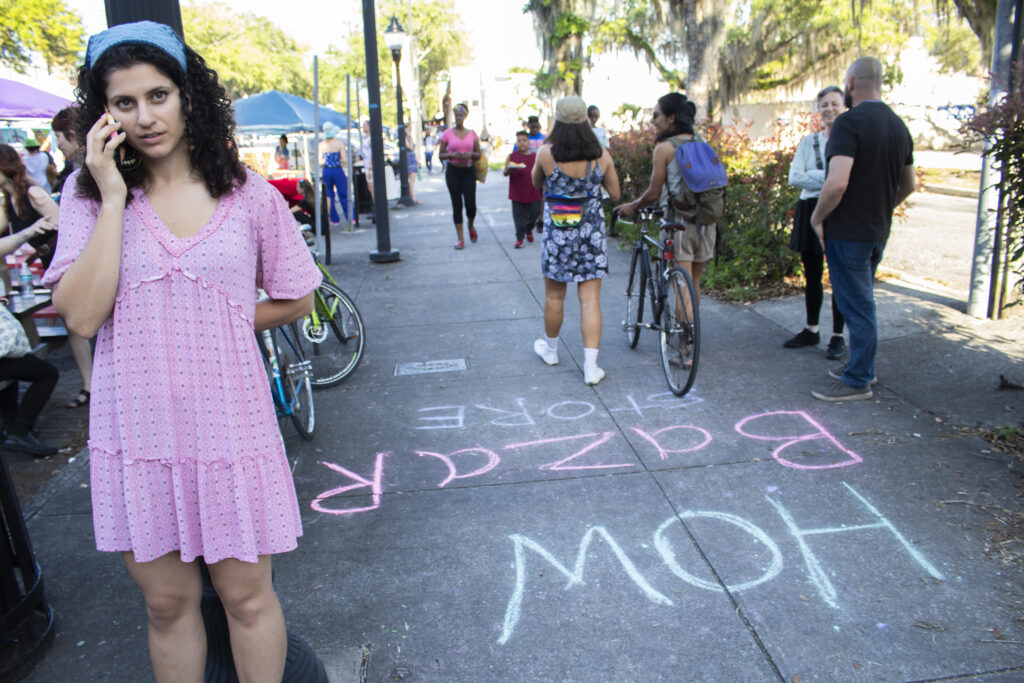
Fakhoury is inundated with calls, especially on night market days. Today alone she receives more than 30 phone calls.
Some vendors greet her with eager grins. Others are less than enthusiastic and ask in agitation where they should go.
“That’s not where I was last time,” a vendor says.
But many swoon over the brains behind the Bazar.
“Those boots are fire.”
“You look so pretty.”
“I just love your…everything.”
No comment, whether complimentary or callous, phases her. She maintains composure and command. She’s firm, but not fierce; in control but not cocky.
But every now and then, irritation worms its way in.
She answers and completes two phone calls in less than one minute.
“People call me for the dumbest things,” she says. But her smile remains, and the irritation has dissipated almost as soon as it arrived.
4:07 p.m.
The market begins to resemble a museum, and plants, used books, vintage clothes, vinyl albums, candles and vegan sweets are the works of art.
For the first time, an aerialist and a woman on stilts pirouette above the market’s crowd. Customers gawk as a woman in the center of the street between the line of vendors twirls through the air, relying on trapeze ropes to create an illusion of defying gravity.
The woman on stilts zigzags through the crowd, stopping often to entertain photos and starry-eyed fans.
An eager stage awaits musical performances and DJs at the end of Southwest First Avenue.
It’s as though a circus swept through downtown Gainesville, and everyone, including the audience, is part of the show.
After a sweep of the bar, Fakhoury fills a wagon with the goodie bags she prepared earlier. One vendor calls it her “fairy godmother trip” as she drags the wagon along.
The smells of cigarette smoke, french fry grease, fried donuts and deeply roasted coffee mingle in the air above, wafting around Fakhoury’s quick, purposeful movements. She steers herself and the clunky wagon through the crowds with ease.
Once the first lap is complete, she goes back to grab Gatorades and bottles of water, which are whole-heartedly accepted amid the conversations with customers and late afternoon heat.
“You’re the best host,” a vendor says after accepting a lemon-lime Gatorade.
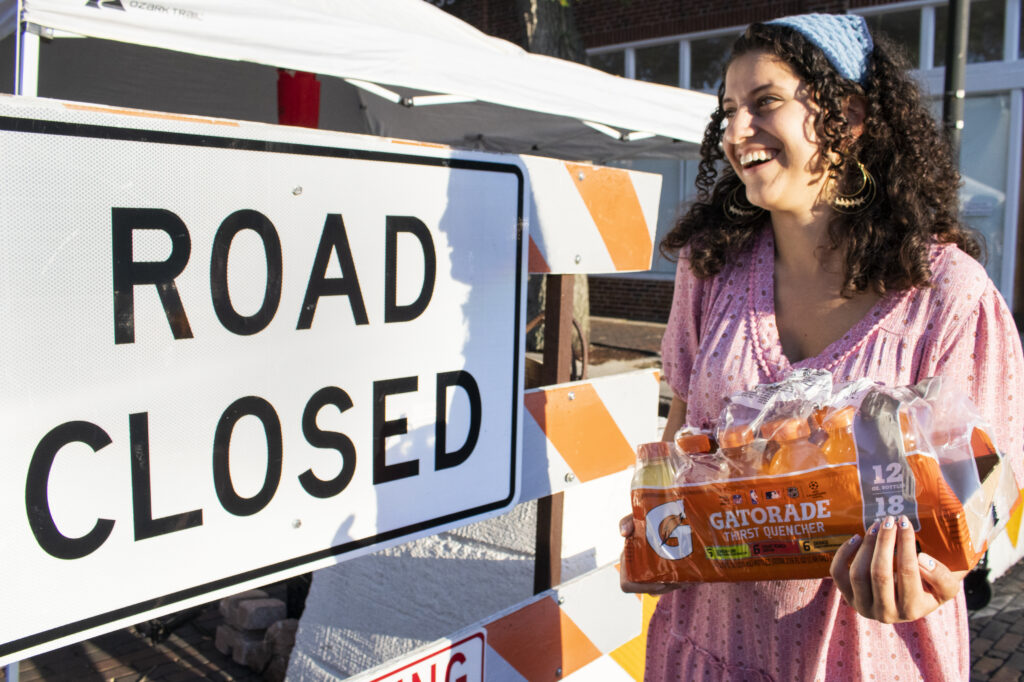
The night market is in full swing as Fakhoury embarks on a journey to gift Gatorade to each vendor as the sun begins to cast long shadows.
She’s had practice as a host, and not just through the How Bazar. In 2019, when she was still an undergraduate student, she launched Dion Dia with two of her best friends. The label paves a way for Florida artists to share and perform their music.
The label has enjoyed a modicum of success; in January, it won a Business Arts Award from the Gainesville-Alachua County Cultural Affairs Board. A few months later, the city formally designated March 17 as Dion Dia Day, which was announced during Dia Days, when local Gainesville residents gathered in Bo Diddley Plaza to listen to local music artists.
Fakhoury joined the performers on stage to thank everyone. She couldn’t escape before an eruption arose from the crowd. They were chanting her name. “Laila! Laila! Laila!”
She grinned but also shook her head and hid behind her clipboard, suddenly shy in the face of praise. She directs the spotlight toward everyone else whenever she can, but on the first official Dion Dia Day, she accepted the recognition with humility.
5:16 p.m.
“Do you want some?”
Fakhoury stops. A vendor offering homemade butternut squash soup and fried bread motions toward a silver pot containing the plant-based creation.
After some nudging, she accepts and begins to eat what is her first meal of sustenance.
She stations herself at one of the nearby concrete barricades and begins to eat.
Despite her hunger, she is quick to offer spoonfuls of the soup to those around her, including a vendor selling homemade coffee.
It’s brief moments like these where she finally takes a breath. During the course of her life, deep breaths have been few and far between.
At an early age, Fakhoury had become somewhat of a local celebrity. When she was 12, an age during which most middle-school girls squabble over first crushes or worry about changes in their bodies, Fakhoury’s attention was elsewhere. She screened “Budrus,” an award-winning documentary film about a Palestinian community organizer, in the College of Central Florida auditorium in Ocala.
At 18, she delivered a TED Talk on how restorative justice can reinvent school discipline and diminish the prominence of the school-to-prison pipeline.
At 22, she stood on the outskirts of the University of Florida campus and held the Palestinian flag above her head, demanding nationhood. This was not an isolated incident, either. Fakhoury spent her four years as a philosophy and family, youth and community sciences undergraduate student at UF proudly amplifying unheard voices.
Her persistence pervades every aspect of her life. But she’s still only human, and she can only ignore hunger pangs for so long.
She brushes her hands together after polishing off the meal.
Back to business.
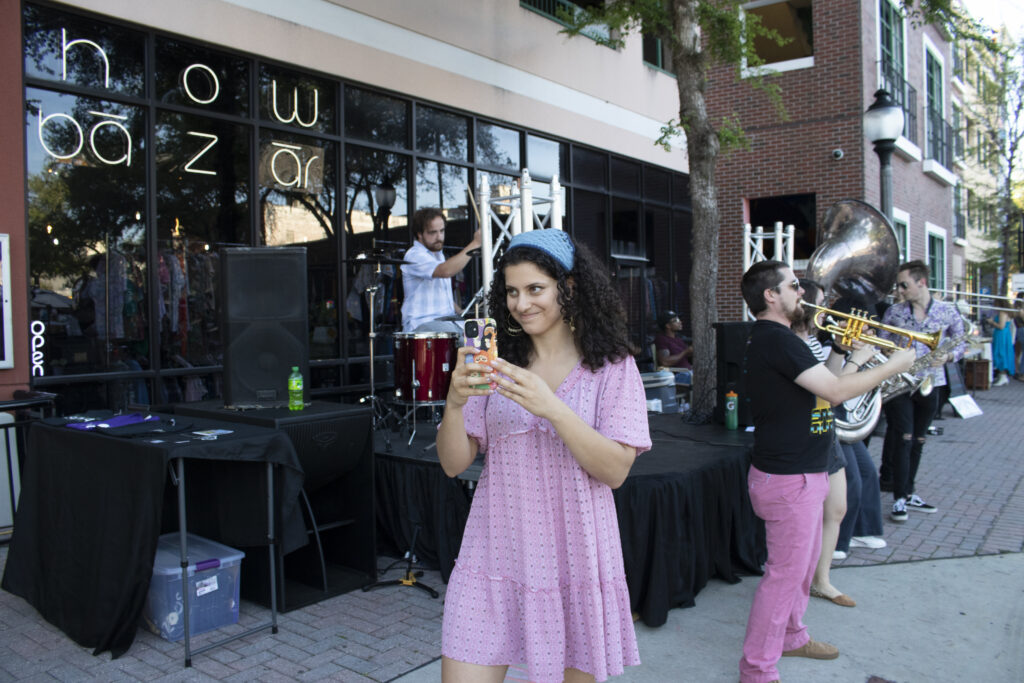
Fakhoury snaps a picture among the brass band playing for a captive audience directly outside the How Bazar building. It is one of the few moments she’s not swarmed by vendors or market-goers seeking a conversation with her.
6:58 p.m.
The sun will soon set, and a “takeover party” threatens to disrupt the night market. By Fakhoury’s definition, that’s people from the fringes of Alachua County or Ocala who gather in downtown Gainesville on Sunday nights to drink, race their cars and, in some cases, fight.
She converses with a Gainesville police officer in the Southwest Downtown parking garage as if they are old friends, and the officer warns her to be safe. Fakhoury is ready to tell the vendors to pack up early if need be.
No threat of any kind fazes her. But her stomach pangs have returned.
She’s craving a burger from DJ’s Cast Iron Burgers food truck that has served ravenous customers all day. The short walk might as well be a million miles away through torrents of people, many of whom stop her, hug her or simply want to talk. It takes her two hours to make it to the food truck, and when she finally does, the owner peeks out from the window.
“We’re sold out.”
9:22 p.m.
By nightfall, the “takeover party” the police officer warned Fakhoury about is in full swing. Luxury cars with oversized rims and revving engines spill into the parking lots next to the market. People drink, swear and threaten one another.
Fakhoury walks over to vendor No. 1 and encourages him to start packing up.
“Leisurely,” she adds.
After visiting a few more vendors and relaying the news, she heads back behind the bar to make some last-minute gift cards as a token of appreciation for the performers: the aerialist, the woman on stilts and the DJs. She makes the gift cards out of gold dog tags, but she can hardly finish one without being bombarded by questions from people on the other side of the bar:
“How much does this cost?”
“Where can I pay for this?”
“Are these the only earrings you guys have?”
She takes care to answer each and flutters back and forth behind the bar, serving drinks, accepting payments for clothes and accessories and engaging in conversations.
“I feel blacked out,” she says. “In a dream.”
10:20 p.m.
Everyone has closed shop, which means Fakhoury sets out on one more round to check on the vendors. She crosses Southwest First Street to reach the other side of the market and spots a slew of police officers chasing a man attempting to flee. Gunshots ring out. It’s enough for alarm. Fakhoury retains her calm and makes her way back to the How Bazar.
It’s 2 in the morning when she finally slips into bed.
Her arms are tired. Her feet, sore. Her stomach is hollow. Still, she sets her alarm, like always, for 4:50 a.m. to make it to her CrossFit class. But for now, she will sleep, brakeless no more.